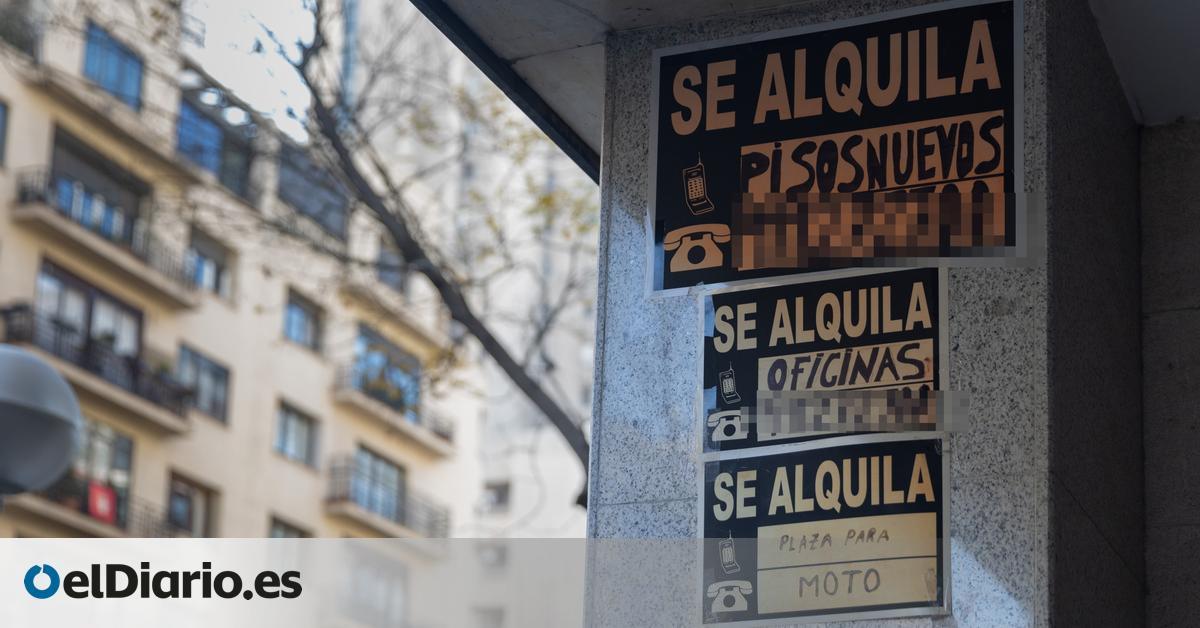
Spain does not fare badly in the macroeconomic scenario: the figures point to a way out of the crisis left by the pandemic and the war with the unprecedented objective of reducing the deficit to below 3% as of 2024. Homework has been done and This allows the European Commission to give the Government a margin to increase primary spending up to 2.6% compared to the previous year to maintain the fiscal adjustment. But when you dive into the data, the picture is more worrying. This is recognized by the European Commission in its evaluation of the Spanish economy corresponding to the spring of 2023, in which it warns of high housing prices and, especially, rentals.
Brussels asks Spain to limit the increase in spending to 2.6% in 2024 to get closer to the fiscal adjustment
Further
“The affordability of housing is a concern”, the European Commission states in the report on Spain’s Stability Plan, in which it uses a set of devastating data on the situation of this fundamental right. One of them is the money that Spaniards have to dedicate to housing and that begins to be dangerous when it exceeds 40% of the income of the family unit. In the EU as a whole, this ratio is higher than 7.5% of households, while the figure rises to 9.9% in the Spanish case.
The situation is more bloody in the case of tenants since it doubles: 40.9% of tenants in Spain allocate more than 40% of their salary to rent compared to 21.2% of the European average, according to the data contained in the document prepared by the community government.
The data coincides with those of the Bank of Spain, which ranked housing as one of the major structural problems of the Spanish economy, and pointed out that 50% of households residing in rental housing are at risk of poverty or social exclusion. “It is the highest percentage in the EU,” warned the institution led by Pablo Hernández de Cos.
“Rising inflation and declining housing affordability –particularly challenging in the rental sector in urban areas– disproportionately affect vulnerable households”, warns the European Commission throughout the 81-page lengthy report. In fact, one of the figures it collects is that the housing deprivation ratio has increased from 1.5% in 2015 to 3.4% in 2020.
The European Commission warns Spain that getting affordable housing is one of the challenges ahead, especially for the vulnerable, among whom it mentions young people, families with children and people with low incomes. In fact, housing slipped into the top ten problems for Spaniards in the April barometer of the Center for Sociological Research (CIS).
One of lime and one of sand
On the other side of the coin, the community government alludes on several occasions to the Government’s intention to invest 2,000 million euros for the construction of 20,000 social rental homes under the umbrella of recovery funds as well as to the state housing law which was finally approved by the Senate a week ago. This norm, which the PP has already anticipated that it will not apply in the communities where it governs, provides for mechanisms to establish limits on rental prices in stressed areas and establishes a maximum 3% increase in 2024.
“In the current uncertain geopolitical context, accelerating the green transition will continue to be a key priority. In addition, more progress is required on fiscal sustainability, addressing structural barriers to business growth and productivity; tackling social issues, such as housing affordability and child poverty; the correction of macroeconomic imbalances, and the circular economy”, sums up the Commission.
The Commission gives one of lime and one of sand in some of the social advances of Spain. Thus, he points out that the benefit system has improved but criticizes the scope it has had: “Transfers continue to have limited effects in reducing inequality and poverty, child poverty in particular, which remain high in comparison and have worsened in relation to pre-pandemic levels”, the text states, arguing that most support policies for vulnerable households are “non-reimbursable tax transfers” within the tax system and that, in his opinion, “limits the effectiveness in reducing poverty, especially in families with children”. There he recalls that the fiscal reform committed to in the recovery plan “has the potential to have a positive impact on fiscal progressivity and to support the most vulnerable households and families with children.”
“In general, there is room for better action in social policy to achieve Spain’s goal of reducing the number of people at risk of poverty or social exclusion by 2.8 million by 2030 (compared to 2019), including 713,000 minors. of age”, concludes the community government.
Despite recognizing that measures have been taken to strengthen the public health system, another of the warnings issued by the Commission is precisely the lack of investment in health, which is below the European average
Likewise, the European Commission mentions on several occasions the fruits of the labor reform. “Under the positive results of the labor reform approved in December 2021, the unemployment rate is expected to continue its decline in 2023 and 2024,” predicts the text, which emphasizes the decrease in temporary contracts in the private sector. “The unemployment rate dropped to 12.9%, which is the lowest rate since 2008,” echoes the Commission before pointing out that, even so, it continues to be double the European average “with structural pockets of vulnerability, including high rates of long-term unemployment, youth unemployment and permanent contracts in the public sector”.
“Spain has particularly improved in gender equality, quality of education and climate action. However, it has yet to catch up with the average of quite a few Sustainable Development Goals, particularly on poverty, decent work, economic growth and reducing inequalities. In addition, it takes steps back in the objective of sustainable cities and communities ”, adds the report.
––––––––––––––––––
Report what matters
elDiario.es is financed by the contributions of 60,000 members who support us. Thanks to them, we can focus on issues such as housing and that all readers – including those who cannot pay – have access to our information. But we ask you to think for a moment about our situation. Unlike other media, we do not shut down our journalism. And that makes it much more difficult for us than for other media to convince readers of the need to pay.
If you get information from elDiario.es and you believe that our journalism is important, and that it is worthwhile for it to exist and reach as many people as possible, support us. Because our work is necessary, and because elDiario.es needs it. Become a member, become a member, of elDiario.es.
Source: www.eldiario.es

